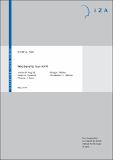| dc.contributor.author | Angrist, Joshua | |
| dc.contributor.author | Pathak, Parag | |
| dc.contributor.author | Walters, Christopher Ross | |
| dc.contributor.author | Dynarski, Susan M. | |
| dc.contributor.author | Kane, Thomas J. | |
| dc.date.accessioned | 2012-09-24T19:53:31Z | |
| dc.date.available | 2012-09-24T19:53:31Z | |
| dc.date.issued | 2012-06 | |
| dc.identifier.issn | 0276-8739 | |
| dc.identifier.issn | 1520-6688 | |
| dc.identifier.uri | http://hdl.handle.net/1721.1/73139 | |
| dc.description.abstract | The nation's largest charter management organization is the Knowledge is Power Program (KIPP). KIPP schools are emblematic of the No Excuses approach to public education, a highly standardized and widely replicated charter model that features a long school day, an extended school year, selective teacher hiring, strict behavior norms, and emphasizes traditional reading and math skills. No Excuses charter schools are sometimes said to target relatively motivated high achievers at the expense of students who are more difficult to teach, including limited English proficiency (LEP) and special education (SPED) students, as well as students with low baseline achievement levels. We use applicant lotteries to evaluate the impact of KIPP Academy Lynn, a KIPP school in Lynn, Massachusetts that typifies the KIPP approach. Our analysis focuses on special needs students that may be underserved. The results show average achievement gains of 0.36 standard deviations in math and 0.12 standard deviations in reading for each year spent at KIPP Lynn, with the largest gains coming from the LEP, SPED, and low-achievement groups. Average reading gains are driven almost entirely by SPED and LEP students, whose reading scores rise by roughly 0.35 standard deviations for each year spent at KIPP Lynn. | en_US |
| dc.language.iso | en_US | |
| dc.publisher | Wiley Blackwell | en_US |
| dc.relation.isversionof | http://dx.doi.org/10.1002/pam.21647 | en_US |
| dc.rights | Creative Commons Attribution-Noncommercial-Share Alike 3.0 | en_US |
| dc.rights.uri | http://creativecommons.org/licenses/by-nc-sa/3.0/ | en_US |
| dc.source | MIT web domain | en_US |
| dc.title | Who Benefits from KIPP? | en_US |
| dc.type | Article | en_US |
| dc.identifier.citation | Angrist, Joshua D. et al. “Who Benefits from KIPP?” Journal of Policy Analysis and Management 31.4 (2012): 837-860. © 2012 by the Association for Public Policy Analysis and Management | en_US |
| dc.contributor.department | Massachusetts Institute of Technology. Department of Economics | en_US |
| dc.contributor.mitauthor | Angrist, Joshua | |
| dc.contributor.mitauthor | Pathak, Parag | |
| dc.contributor.mitauthor | Walters, Christopher Ross | |
| dc.contributor.mitauthor | Dynarski, Susan M. | |
| dc.contributor.mitauthor | Kane, Thomas J. | |
| dc.relation.journal | Journal of Policy Analysis and Management | en_US |
| dc.eprint.version | Author's final manuscript | en_US |
| dc.type.uri | http://purl.org/eprint/type/JournalArticle | en_US |
| eprint.status | http://purl.org/eprint/status/PeerReviewed | en_US |
| dspace.orderedauthors | Angrist, Joshua D.; Dynarski, Susan M.; Kane, Thomas J.; Pathak, Parag A.; Walters, Christopher R. | en |
| dc.identifier.orcid | https://orcid.org/0000-0001-6992-8956 | |
| dc.identifier.orcid | https://orcid.org/0000-0001-8621-3864 | |
| mit.license | OPEN_ACCESS_POLICY | en_US |
| mit.metadata.status | Complete | |
